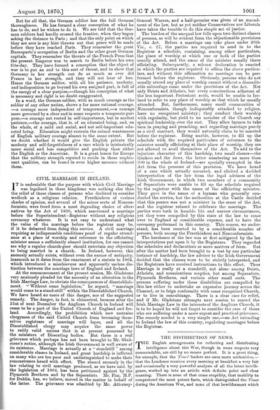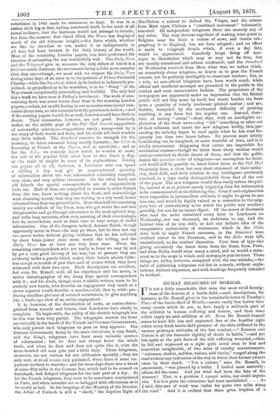THE DISTRIBUTION OF NEWS.
THE English _arrangements for. collecting and distributing
intelligence about this War, though in some respects very commendable, are still by no means perfect. It is a great thing, for example, that the Times' leaders are once more authorities,— that the Londoner receives every morning at breakfast a very fair and occasionally a very powerful analysis of all the latest intelli- gence, worked up into an article with definite point and clear meaning. There is none of that crass stupidity, that inability to comprehend the most patent facts, which distinguished the Times during the American War, and none of that bewilderment which
sometimes in 1866 made its utterances so hazy. It was in a rather thick fog at first, having convinced itself, in the teeth of all moral evidence, that the Germans would not attempt to invade ; but from the moment that cloud lifted, the Times has displayed much of the old Crimean insight,—the force which, whether we like its direction or not, makes it so indispensable to all who feel keen interest in the daily history of the world. Most of the remaining London papers, too, have performed the function of estimating the war wonderfully well. The Daily News and the Telegraph give us accounts the only defect of which is a little too much clearness, the movements being a little more complex than they say—though, we must add, we suspect the Daily News during some days of an error as to the position of Prince Frederick Charles—while the Standard, which in its leaders is ludicrously pre- judiced, so prejudiced as to be worthless, is in its " Diary " of the War almost exceptionally painstaking and truthful. The only bad day's work we have seen is Friday's instalment. The work of sum- marizing facts was never better done than in the morning London papers,—which, let us add, having in our memories some recent com- ments of our own, on this occasionbeat the provincials hollow,—and if the evening papers would do as well, London would have little to desire. Their summaries, however, are not good. Somebody makes on the middle page of the Pall Mall Gazette suggestions of noteworthy acuteness—suggestions rarely, wrong—but he is too chary of both words and facts, and his rivals tell their readers very little indeed. The Standard reserves its strength for the morning, its latest comment being usually fantastic ; the Globe is becoming as French as the Figaro, and as unreliable ; and as for the Echo, we scarcely know which to wonder at most, the sale of the popular little sheet four or five times a day, or the want of insight in some of its explanations. Taking the papers all in all, however, a Londoner who can spend a shilling a day may get an unprecedented quantity of information about the war, information admirably compiled, very clear, and very seldom erroneous. On the other hand, our old friends the special correspondents are of comparatively little use. Half of them are compelled to remain in cities distant from the war, know nothing about the front, and acknowledge with charming naivete that they are writing to a city much better informed than they can pretend to be. More than half the remaining moiety are soldiers of the Press, men who get under fire and into disagreeables and go through adventures in the most spirited way, and write long accounts, often very amusing, of their own mishaps, but do, nevertheless, send us from time to time scraps of useful information. One of the foragers, indeed, Azamat Batuk, though apparently never in front—he may go there, but he does not say so—never writes without giving evidence that he has collected by sheer brain-power some news worth the telling, and the Daily News has at least one very keen man. From the remaining correspondents who are really in front we may by and by get a very good history of the war, but at present they are evidently under a parole which makes their letters almost value- less except as records of past facts and of scenes which they have witnessed with their own eyes. Their descriptions are excellent, but even Dr. Russell, with all his experience and his nerve, is rather historiographer of the Army than special correspondent with it ; and his rivals, though most readable writers, seem to be entirely new hands, who describe an engagement very much as a clever reporter would describe a murder,—fail, that is, while pro- ducing excellent pictures of isolated occurrences, to give anything like a bird's-eye view of an entire engagement.
It is, however, of the distribution of news, as contra-distin- guished from records and letters, that Londoners have chiefly to complain. To begin with, the utility of the electric telegraph has in this war been very partial. The telegraphs nearest the front are virtually in the hands of the French and German Governments, who only permit such telegrams to pass as they approve. The German Government, being in the main victorious, is very frank, and the King's telegrams have been most valuable sources of information ; but he does not always know the whole truth, and when he does and does not quite like it, even the stout-hearted old man gets just a little hazy. These telegrams, moreover, are not written for our edification specially ; they are only sent, or at all events only published, when there is some im- portant incident to describe ; and for some days there was a break of some fifty miles in the German line, which had to be crossed on horseback, and delayed telegrams for the best part of a day. As for the French telegrams, they seem to be sometimes manipulated in Paris, and when accurate are so befogged with officialisms as to be nearly as bad. In the language of the Ministry of the Interior, the defeat of Forbach is still a " check," the hopeless flight of MacMahon a retreat to defend the Vosges, and the retreat from Metz upon Chalons a " combined movement" voluntarily executed. Of independent telegrams there are scarcely any of any value. The very obvious expedient of making some point in Belgium near the front a centre of news, and thence tele- graphing it to England, has not been adopted ; and no effort is made to telegraph details which, if even a day late, would be appreciated. Somebody keeps firing off mes- sages to Manchester which may or may not be true, but are usually sensational and seldom confirmed ; and the Standard on Wednesday received from Metz what was, we rather think, an excessively clever telegram, so drawn as to pass the French censors, yet be perfectly intelligible to observant readers ; but, as a rule, no non-official telegrams have been worth much, while official and unofficial messages are presented to the public in the crudest and most inconvenient fashion. The proprietors of the newspapers are apparently under an impression that the British public will not buy news by itself, but wants besides the fresh news a quantity of totally irrelevant printed matter ; and are, besides, hampered by the mechanical difficulty of printing anything in any form but the regular one. Instead, there- fore, of issuing " extras"—short slips, with an intelligible ex- planation of the fresh news—they " lift " something or other out of their columns, and insert the new telegram bodily, thus per- suading the unlucky buyer to read again what he has read fre- quently less than two hours before. No process more utterly bewildering can be imagined, or more wasteful of time, and it is wholly unnecessary. Supposing that extras are impossible for mechanical reasons—though we think those sharp urchins would manage somehow to divide sheets of them, and that the public desires the ipsissima verba of telegrams—an assumption we doubt —it would still be possible to insert below them, as the Pall Mall frequently does, a clear but very short statement of their autho- rity, their drift, and their relation to any intelligence previously received, in a type easily distinguishable from that of the rest of the paper. The new telegram would then really inform the pub- lic, instead of as at present merely supplying data for information to be communicated on the following day. Even if such explanation were impossible in intermediate editions, it might be given in one late one, and would be highly valued as a corrective to the snip- pety bits of contradictory news which the public now swallows greedily, but can by no means digest. Of the scores of thousands who read the news submitted every hour to Londoners on Wednesday, not one thousand, we undertake to say, had the faintest idea of its true drift, or had any definite idea of the comparative authenticity of statements which in the Globe were held to imply French successes, in the Standard were credited rather to the Prussians, and in the Echo were left, unattributed, to the readers' discretion. Four lines of type also giving accurately the latest dates from the front, from Paris, and from Berlin would clear many a mind, and so would a state- ment as to the maps in which each newspaper puts its trust. These things are trifles, however, compared with the one mistake,—the habit of publishing telegrams red-hot in morsels, without expla- nations, without sequences, and with headings frequently intended to mislead.































 Previous page
Previous page